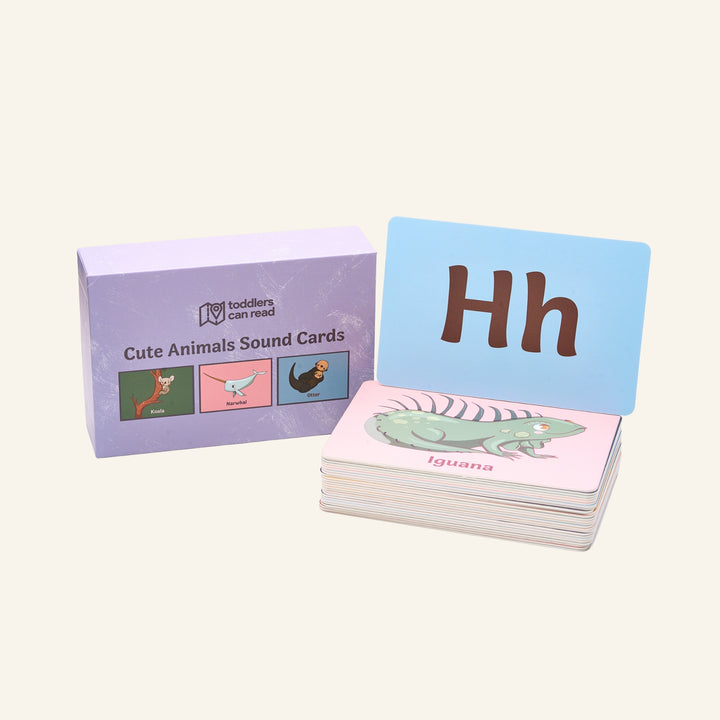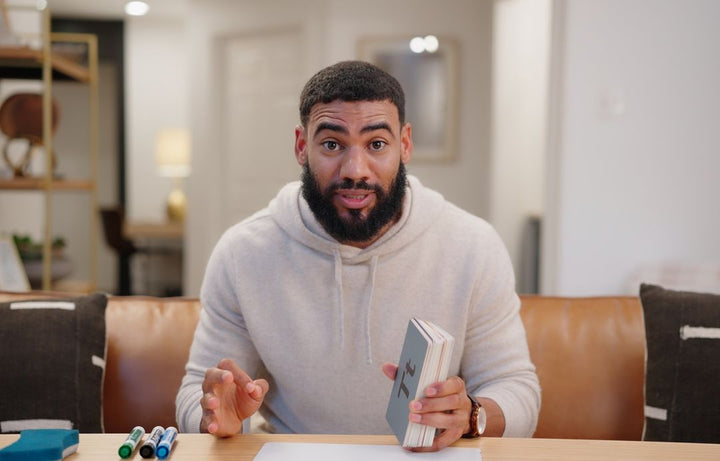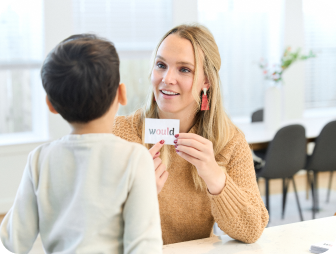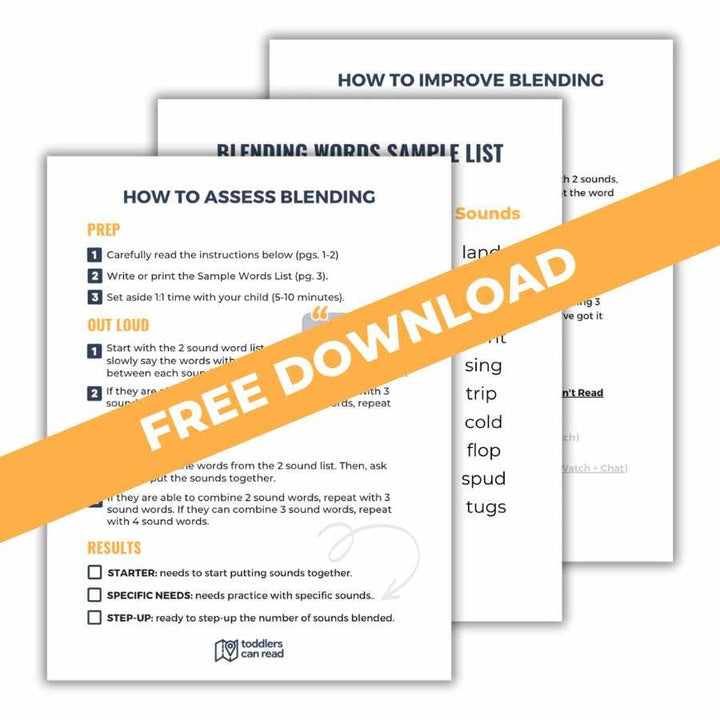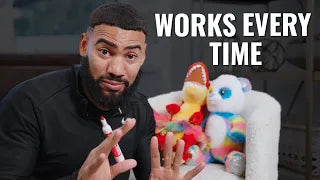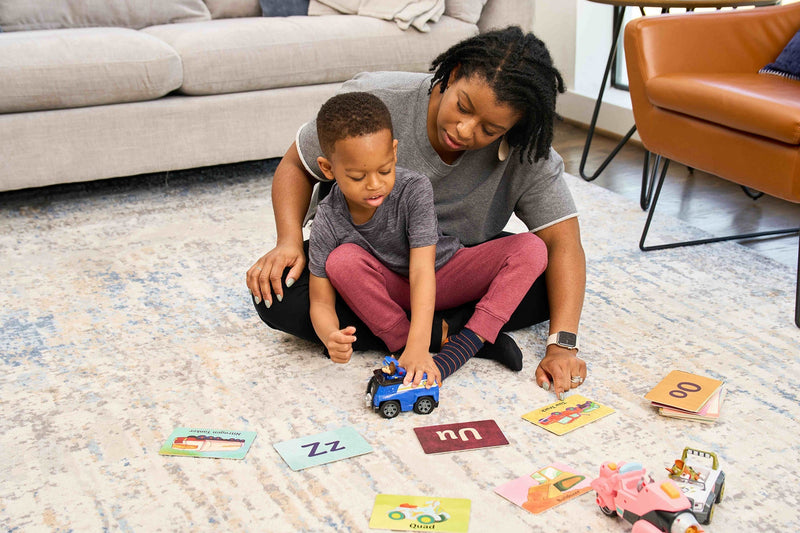Picture this: Your little one has been in kindergarten or first grade for the past 4 weeks, and you're coming home from your first parent-teacher conference. The teacher is friendly, they love your child, and your child seems to love school and the fun activities they do with their friends. But as you leave the classroom, the excitement you felt before the conference has now turned into anxiety and concern. You're confused. Why?
Because their teacher just hit you with the news that your little one is behind in reading. You didn't know they could be behind when they're just 5, or 6, or 7, but they are. You saw the teacher's notes and assessments, and while you aren't sure exactly what all of it means, you know it's true. Come to think of it: your little one does avoid reading books and has started saying that reading is "boring." They guess the wrong words from the pictures or give up if they get to a word they haven't seen before.
You rack your brain trying to figure out how this happened because you've done everything right, right? You read to them every night, you sang them the ABCs, you bought them reading apps, and it seemed like everything was on track at their preschool or daycare.
You go home and call a family member or friend for advice. They say something like:
- "They're so smart... There's no way they're actually behind in reading!"
- "That teacher's crazy... Kids don't need to do that until they're 8 or 9!"
- "Don't worry about it, every kid learns to read in their own time!
- "It's OK... All kids catch up eventually!"
You Google "how can I make my child a better reader?" and find a list of suggestions that you're already doing:

If this is what your Google search history looks like, you're not alone.
But here's the thing: almost every article written on this subject is full of bullshit advice. And while I'm sure your friends and family are amazing people, their goal is often to make you feel better. Not to help your child read better. And there's a big difference.
Meet the Teacher: Spencer Russell
You see, I learned early in my teaching career that it was better to tell parents the truth about their kids- even if it was hard to hear- than to pretend that everything was OK. In other words: I believed that my students' feelings mattered just as much as their parents' feelings. And this meant I had to have a lot of uncomfortable conversations with families about their child's behavior, about their child's academics, and yes, about their child's confidence.
Now, if this were a parent/teacher conference and you asked me, "How can I help my struggling reader?" I'd dive in and tell you exactly what you need to do to help make your child a better reader. And you'd trust me because you know me...I would have already shared my credentials with you on Meet the Teacher Night. I would have already shown my commitment to your child in the first weeks of school. And I would have already visited your house and had a meal with you to discuss your goals and aspirations for your little one.
But I don't know you, and you probably don't know me or why you should trust me. Especially when everyone else is giving you such "feel good" advice. So before I tell you what you need to do to finally build confidence in your little one, here's a quick "Meet the Teacher."
- I was "homeschooled" in kindergarten and did not learn how to read.
- I was one of the 2 worst readers in my class when I started first-grade.
- Eventually, I became a kindergarten and first-grade teacher myself.
- I spent years learning how to improve my students' reading, FAST (spoiler alert: this is how you build their confidence)

After working with hundreds of students and families and leading professional development sessions for teachers and administrators, I've filtered my learning for you. I've combined what I've learned into 4 steps so that YOU can build your struggling reader's confidence quickly too!
Building Your Struggling Reader's Confidence
Step 1: Identify why your child lacks confidence.Is your child...
- Complaining about reading time?
- Giving up after a few words?
- Guessing words based on the picture?
- Skipping words they haven't seen before?
- Avoiding reading time however they can?
These are common symptoms of a child who struggles with their reading. And while it may look like a lack of confidence, the root cause is actually a lack of competence.
You see: kids can tell very early in their school career whether they are ahead of, behind, or on track with their peers. Just think back to your own school experience: how old were you when you knew who the smartest kid in class was? How about the dumbest? Because I was 6, and I can name both of them to this day.
And when your child is in school, they're constantly comparing themselves against their peers. So if they're struggling to read, their first thought is probably not, "Oh! I bet if I work really hard at reading, I can get better." It's probably something more like, "I'm no good at this. I don't want to do reading!"
This is why we need to identify the root cause of why our child lacks confidence in their reading. It has nothing to do with their personality or self-esteem, but it has everything to do with their reading ability. And this should be encouraging for us. Because while we can't control how our child feels about reading, we can help them become a better reader, which will change how they feel.
Step 2: Eliminate "solutions" that don't improve their reading ability.Are you...
- Constantly giving pep talks to encourage their reading?
- Telling them, "you can do it," or "just keep trying!"
- Reading them book after book to get them more interested?
- Practicing the same workbooks or sight word cards over and over?
- Targeting random reading skills based on what they bring home?
- Changing your strategy after every conference, hoping something works?
If you're like most parents, this list looks very familiar. And you might not even recognize what's wrong with each of these things because they're all done in good faith.
And I get it. For so many things in our child's life, our good intentions were good enough to get them over the hump. Like when they were afraid to take their first step, and we encouraged them that it would be ok. Or, when they struggled to understand potty training, we kept trying until it clicked.
But the truth is, learning to read is different. It's not something that kids simply get better at from "trying" their best. And it's not something they naturally pick up from being read to or by doing random activities. And I know this is hard for some folks to understand, especially if you don't remember learning how to read yourself (consider yourself lucky: you were probably taught how to read the right way from an early age.) Reading is a skill that needs to be taught well for kids to be able to do it.
So if you find yourself spending a lot of time and energy on pep talks, you may want to save that time and save that energy because your child knows they can't do it. No matter how many times you tell them to keep trying.
If you find yourself reading book after book in the hopes that something captures their attention and interest, you can keep reading to them, but it's not going to help. The issue isn't their interest. The issue is their reading ability.
If you find yourself practicing the same workbooks or drilling sight word cards, you'd be better off getting rid of them and starting fresh. If what you were doing was working, then they wouldn't be behind. Let's save that time and use it to start teaching the specific skills they need (see steps 3-4.) Because learning to read doesn't mean spending a LOT of your time. It means spending your time the RIGHT way.
Step 3: Assess their current reading level and ability.Okay, so now that you know the root of the problem (they're struggling to read) and what NOT to do (there's a long list here...), it's time to figure out what you should do to improve their reading ability. And this really starts with assessing their current reading ability and getting a detailed sense of what they CAN and CAN'T do.
You can think of this like a "check-up'' at a doctor's office. If you go into the office and say, "Doc, I'm sick," they're not going to start by prescribing you medicine. They're going to start by asking questions, running tests, and diagnosing whatever is causing the issue.
Likewise, with our children, our job is to ask them some questions, run some tests, and figure out the biggest thing that's holding them back from being able to read successfully.
Here are a few tips for getting started:
- DO set clear expectations for what they'll need to do
- DO take notes on what you're observing in the moment
- DO take breaks as needed
- DON'T talk about it too much or apply unnecessary pressure

Levels of Reading Assessment
Level 1: Do they know the single letter sounds?
The first thing you want to check is whether your little one knows their basic, single letter sounds. And this assessment is pretty quick. You'll want to start with a list of the letters (flashcards or hand-written) and shuffle them up randomly. Then, show them to your child one by one and ask them, "What sound is this?"

(I also wrote a blog post on this if you prefer reading over watching videos.)
NOTE: While you definitely CAN start the blending words phase even if they're still learning their sounds (especially if you're blending OUT LOUD since you are the one producing the sounds,) just keep in mind it will be another portion of practice time to add. So instead of doing just one activity with them (learning sounds) you'd be doing two activities (learning sounds + blending words.) This is why a lot of families I've worked with have found it easiest just to focus on mastering the 26 single letter sounds first.
Level 2: Can they blend sounds together into words?After assessing their letter sounds, you can assess their blending ability. And what you're looking for is their ability to blend different sounds together into words. Some children can do this with 2 sounds at a time but not 3. Others can do it with 3 sounds at a time but not 4.
Your goal is to learn how many sounds YOUR child can blend together at a time. And to do this, you'll want to assess them with their blending out loud (just hearing the sounds) and written down (seeing and reading the sounds.)
To assess their blending out loud:
You'll want to start with just 2 sounds and see if they can combine them into one smooth word. For example, you might break apart the word "at" by saying "A" (pause) "T." And they should be able to remember those sounds in their head and combine them together to form the word "AT!"

If they can blend 2 sounds out loud, then move to 3 sounds, then 4 sounds, etc., to determine how many sounds they can handle at a time.
To assess their blending written down:
You'll follow the same exact steps as out loud blending, but this time you'll write the words down. Again, you'll want to start with a few 2-sound words (these do NOT have to be real words) and move up from there.
To make it easy- download this free blending cheat sheet!
Level 3: How well are they able to read books?If your child knows most of the single letter sounds and can blend basic words (out loud and written down), then chances are they're already practicing reading in books. And this is the stage where a lot of children, especially older children, struggle because there are so many different skills needed to successfully read a book.
So, if your little one is at this stage, I highly encourage you to read this blog post, How to Assess Your Child's Reading Ability (At Home!). In this blog, I'll go into more detail on:
- How to select the right book to assess them with,
- How to take notes as they read, and
- What sorts of things (phonics sounds, number of sounds, tricky words, etc.) are most challenging for them.
Step 4: Address their biggest gap(s) first.
Question: "So now that I know what my child CAN and CAN'T do, what do I do with all that information?"
Answer: You take a small step forward. And then another one. And then another.
And this is the key. You see, many of us teach too much, too soon, because we desperately want to help them catch up. But when you try to teach EVERYTHING at once, you end up teaching NOTHING. And when you take a step that's too big, you end up falling.
Have you heard of the phrase, "one bite of an elephant at a time?" Helping your child become a better reader works the same way: we build their reading ability one step at a time.
To help plan your next steps, you should:
- Review the notes from your "reading check-up."
- Pick the FIRST skill they are missing.
- Break that skill into a small chunk that you can teach.
For example: If your child has not mastered their letter sounds yet... you would start there and pick just a few of the sounds they're missing to teach.
Or, if your child is struggling to blend 3 sound words out loud.. you'll want to identify that problem and spend a few minutes every day practicing blending 3 sound words out loud until they've got it down.
Or, if your child is reading books and your notes show that they really struggle with long vowel sounds... you'd want to select just a few long vowel sounds to practice until they know them.
YOU can build your child's reading confidence FAST(er).
It takes most children YEARS to learn how to read. And for many of us, even as adults, we're still "learning how to read" better and better each year. I know I am.
So when I say: you can build your struggling reader's confidence FAST, I don't mean this will happen overnight. But if you:
- Identify why your child lacks confidence
- Eliminate "solutions" that don't improve their reading ability
- Assess their current reading level and ability, and
- Address their biggest gap(s) first, then,
It is going to happen a LOT faster.
And this doesn't need to take a lot of time, but it does need to be focused and consistent. If you keep taking steps forward on exactly what they need for each reading skill, you can help them catch up and build their confidence in as little as 5-10 minutes each day. Seriously.
And I know: teaching your child to read can feel overwhelming. It can feel difficult or complicated. To be honest, it probably feels like it's someone else's job. But at the end of the day, your child deserves to become a confident reader, and you deserve honest information about how to help them.
And while you don't need any teaching experience or a lot of time to help your child become a better reader, you might want some additional support; my free Beginning Reading Workshop is a great place to get started learning the basics.
We can't change the past. But we can change their path.
Remember those parent-teacher conferences I told you about? The ones where I would sit face to face with my students' parents and tell them that their child was behind where they were supposed to be and that it was affecting their confidence?
Before they left my desk. Before they got in their car. Before they went home... I made a point to tell each and every one of them the same thing I'm telling you: "There's nothing we can do to change the past. But we CAN work as hard as we can moving forward to make sure your child has every possible opportunity to be successful."
Remember: You CAN do this, and your little one CAN too.

